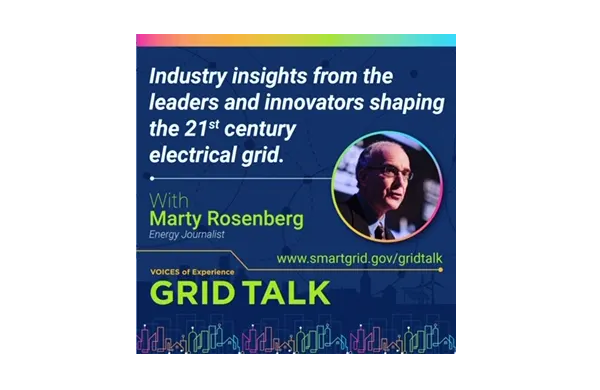Artificial intelligence and machine learning will make a big difference in boosting our reliance on intermittent renewable wind and solar power.
In this episode of Grid Talk, host Marty Rosenberg interviews Dalia Patiño-Echeverri, professor at the Nicholas School of the Environment at Duke University.
With renewable energy being deployed at a rapid pace, making sure there is back up, or reserve, power available to meet peak demand is critical. Patiño-Echeverri is using sophisticated forecasting models to precisely predict fluctuations in renewables and reserve generation needs to be ramped up or down.
“We will be in a better position to integrate the valuable renewable energy that we get from solar and from wind because we will be considering all the possibilities and we’ll be prepositioning our system in the best way to cope with the variability and the uncertainty of these resources,” said Patiño-Echeverri.
“The number one benefit that we see in our technology is that we’re going to have the right level of reserves at each moment and in time in our system.”
“And with artificial intelligence and with machine learning, we have found ways to run these models that are more sophisticated, more demanding of computational resources. We have found ways to simplify those requirements and we have found ways to run them faster.” interviews Dalia Patiño-Echeverri
Dalia Patiño-Echeverri is the Gendell Associate Professor of Energy Systems and Public Policy at the Nicholas School of the Environment at Duke University where she explores, assesses, and proposes technological, policy, and market approaches to contribute to the goal of striking a balance between environmental sustainability, affordability, and reliability in electricity systems. She received B.S. and M.Sc. degrees in Industrial Engineering from University of The Andes, Bogotá, Colombia and the PhD degree in Engineering and Public Policy from Carnegie Mellon University.
About Grid Talk:
Grid Talk is a podcast featuring the leaders and innovators shaping the 21st century grid. Hear the stories—in their own words—of how they are meeting the challenges and transitioning their businesses to operate successfully in a new era of evolving markets, changing regulations, higher customer expectation, increasing cybersecurity threats, demands for cleaner energy sources, growing customer-owned generations and emerging technology. The podcast is part of Department of Energy’s Voices of Experience, an initiative that supports grid modernization by sharing insights, lessons learned and advice on operating in a rapidly evolving industry.
About the Host:
Grid Talk is hosted by award winning, energy journalist Marty Rosenberg. For nearly 40 years, Marty has been covering business, energy, finance, and technology. He was the Editor-in-Chief for EnergyBiz from 2004 to 2014. EnergyBiz was an award-winning national publication covering energy and utilities. Marty has been published in multiple media outlets including the New York Times, Huffington Post and USA Today. Marty plugs into the industry knowledge base to deliver critical information about the opportunities and challenges facing utilities today. The result is engaging conversations about modernizing our electric grid.
For more episodes – https://www.smartgrid.gov/gridtalk/









